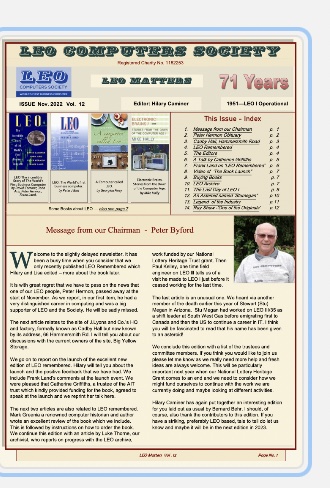LEO Interviewee: Ninian Eadie DOB 15th March 1937
Interviewer: Two Interviews, by ArchivesUK, and for LEO Oral History Project by John Ferguson plus a third memoir by Eadie himself.
Date of Interview: LEO interview 6th July 2017
Joined 1960
Role in LEO: Joined LEO as a trainee programmer, rose rapidly in a variety of roles including teaching, defining CLEO, sales management in South Africa, managing the important Post Office project and taking senior management roles in EELM and subsequently ICL and Fujitsu.
Left LEO, on 1967 merger to take senior roles in ICL
Abstract:
Education, prep school, Winchester, Balliol College, Oxford (PPE). After National Service in the Navy joined LEO as trainee programmer. His LEO career included teaching on training courses, joining LEO teams assisting customers like Cerbos, defining LEO III software, acting as sales manager for LEO’s joint venture with Rand Mines in South Africa, and culminating in the role of Project Manager for the LEO III and System 4 Post Office project, the largest and most technically and politically project in LEO history. Following the merger which created ICL in 1967, he took on a series of increasingly senior roles for ICL and its successor companies, including managing ICL’s international sales organisation, acting as assistant to ICL’s chief executive and under Fujitsu became (1993 -1996) Group Executive Director for Technology before retirement. Amongst his outside interests he became an internationally recognised Dinghy racer.
Repository ArchiveIT: Ninian Eadie – Archives of IT (archivesit.org.uk) Repository recording and edited transcript by John Ferguson: http://www.computinghistory.org.uk/det/63000/Ninian-Eadie-Interview-6th-October-2017-63000/
Repository memoir:https://docs.google.com/document/d/11helrhqsYB1bjMijqiolYOAcyPFrCHxA/edit?usp=share_link&ouid=106995194925914651236&rtpof=true&sd=true

